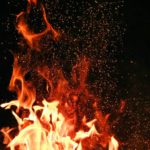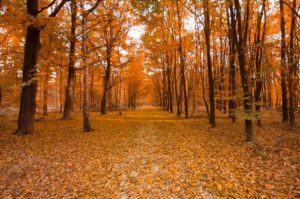|
|
The troops slipped over the border before dawn and set about rounding up the populace. My brother and I got word of this from a passing family that urged us to surrender. Our grandmother, sixty and hale and a survivor from the last war, filled our bellies, pressed her face between our cheeks, and bade us to run. We made off up into the mountains, along with a few other families and loners, skirting the troops that descended upon each little village in our path. We stole when we needed, and we stole often. We took the goat paths up into the bush and gradually our small caravan of toddlers and parents and lone wolves dispersed throughout the thick forest slopes. My brother and I continued upwards, steering clear of the paths carved before the war, holing up in damp caves or under the wreckage of fallen trees. We set traps for squirrels and martens and deer, but we had more luck swiping fish from the streams, especially during the dry season when the rivers became shallow. And there was always berries and pine nuts and sometimes fallen fruit down on the lower slopes if we were willing to risk it. We rarely saw the other families that fled with us but when we did we would exchange news and food. But after a time, the children that grew up in those hills became wild and fierce. They stood their ground, chests full and eyes aflame when they saw my brother and me. Once, when I was alone, they attacked me and stripped me of my clothes and catch. I only escaped because my brother came down the mountain and frightened them off with a terrific, guttural roar. He pulled my naked body back to our cave and lit a fire to warm me up. The next morning, he placed a few branches over my shivering body and left me beside the fire. It was a full three days before he returned but I was so shocked by his appearance that I ran away from him. He quickly caught up to me in my frail condition and with a huge grin across his now thickly bearded face boomed, “Sister! It’s me!” And, indeed, it was him, except over the whole of his head and body he wore the pelt of a moon bear. In his arms he held another and this he handed to me. “Put it on.” I obligingly draped it over my shoulders and stepped into the skin of the dead beast. I could feel the gelatinous fat buffer against my nude skin. At first, it made me squirm and wretch, but the warmth was undeniable. I shimmied my legs into the baggy skin and felt the soft pads of black flesh underfoot. I took hold of the toothed-head hood and placed it over my face inhaling the dead bear’s scent, my eyes shining brightly from out of the empty sockets where coal-black ones once lived. I found the clasps down the belly that my brother had tailored using bone and fastened them. The last clasps brought together the creamy crescent moon just over my breast. “I thought there were none of these left?” I spoke running my fingers through the coarse fur. “Only a few. I set a trap and these two juveniles came and I caught them. I have lots of meat left as well.” Thus, our lives posing as bears had begun. The wild, malicious youths now ran from us and so did the game when they smelt the musk that wafted off the dead bear’s pelt, so we stuck to the rivers and to fishing. Down in the valley, the soldiers tightened their grip and encircled the mountain range, pushing us further and further up the steep cliffs. We would hide when they marched through the forests with their gleaming gun barrels and clanking gear. To escape them we often had to crawl and scratch up muddy banks and carve our own secret paths through the dense forests. Each time, on their way down, they would have a few hamstrung bears balanced upon their shoulders, along with dozens of boars and deer, until only a seldom few remained. Our homes changed with the seasons. In summer, we sought hollow trunks high in the swaying trees while in winter we crept into caves to light fires and keep warm. We rarely took off our pelts no matter the season. I stopped counting the days and months. Only the turning of the new year mattered now. Soon my brother and I began to spend more and more time apart. We fished different streams and marked out different trails. I stayed in the higher slopes while he frequently visited the outskirts of the little villages at night to steal fruit and pigs and news. It had been four turns of spring before I noticed that the soldiers stopped coming. Occasionally, some villagers would come up the slopes to fell trees for houses or heating. I watched them, alone, through the eaves. That New Year’s came and the weather, which had turned weeks before, spread out a downy blanket of snow upon the sleepy mountains. I had managed to trap a water deer and slung this rare prize over my back when I thought about how nice it would be to go and see my brother. I followed his lightly marked tracks to his den. There was a fire roaring, but he wasn’t there. I hung the deer up and went to look for him. Outside the cave, I found his footprints meandering their way down the mountainside towards a farmhouse close by. It was a hard walk in the snow and at such a cold time of year. I followed him down. It wasn’t long before I reached the edge of a clearing that held a farmer’s hut. The place was fenced off with razor wire to keep the boars out. Pigs uproot everything. I slunk behind a tree and peered out from frozen eye-sockets. Smoke plumed from the chimney, but the windows were covered so I couldn’t see in. The ground was frozen. Nothing stirred upon the homestead. Suddenly, in the brush to my left I heard an awful groan and the sound of a thrashing wild thing. I drew my knife from my belt with my clawed hand and approached the sound. I pounced over a fallen, sodden trunk to find a huge, writhing black-haired mass caught in a steel trap. The beast’s head snapped back towards me. My brother’s matted and muck-spattered face rolled in the linen white snow. I dropped my knife and released his caught arm from the trap. “What were you thinking?” I whispered into his agonized face. “Potatoes.” He grimaced and cocked his head to the three fallen spuds smashed into the dirt from his thrashing. “Idiot.” I picked up my knife and began to cut away his pelt where the steel had bit. The pelt was difficult to remove and in some places my brother’s hair had begun to fuse into that of the bear’s and become knotted. He yelped as I tore and cut and hacked down to his skin. The trap had ripped down to the bone. I picked up some fresh snow and pressed it into the wound to clean it. He looked down at his arm and his face became bloated with horror. A scream escaped his lips before I could stifle it. The hut remained quiet. “You need help. We can’t fix this.” I caught his eye and looked towards the farm. He nodded. I hoisted him up over my shoulders and crossed the barren field to the farmhouse door. I laid him on the steps and went to knock before he stopped my hand. “No. Go now!” He hissed through clenched teeth. He pushed me away and pointed to the hills. It was the last time I ever saw my brother. I turned and ran and didn’t look back. I still remember the bang upon the wooden door that broke the slumbering farm and hopefully saved my brother. He never returned to the hills to get me. Yet, even through all the flowing years between then and now, I still check his favored haunts and glades from time to time, hoping for his return. My brother was gone, the moon bears were dead, and the seasons marched on. Seven years then nine then twelve, the farms grew bountiful and peaceful, unlike the haggard, grim huts from before. The soldiers left the villages long ago and, from afar, it seemed that all returned to a state of normalcy. I even found a flier claiming the war was over and for everyone to return home and re-register themselves in a new national census. It was good kindling for my fire that night. Decades passed. I hadn’t seen a person in a long time since I stuck to the upper slopes and never ventured near the villages after the incident with my brother. The moon bear pelt became ragged, the left canine tooth had cracked off and only a few claws remained. Luckily, my own black hair began to sprout through the molted patches of fur and fat. As if through some sort of forced adaptation, hair sprouted out of every follicle on my body, from the knuckles on my hands to those on my toes. One day, as I lapped water from a stream, I heard a click from somewhere behind me. I paused. Then I heard another. I spun around and dove behind a boulder. The clicking continued furiously for another minute and then stopped. Across the river was a steep hill. I bounded over the stream and scrambled up the muddy bank on all fours before disappearing into the underbrush. I didn’t stop moving until I got home. The next morning, I woke to the sound of barking voices and the din The next spring, the mountains were overrun with people. They came stamping along those same trails with large packs and sticks and cameras. They sang songs and laughed and took naps under the swaying pines. They found my bathing pool and had picnics there and all the other animals fled from them, leaving food hard to come by. This went on for weeks until I finally stole out from my den on a moonless night and galloped down the mountain to find some answers. I streaked past the old farm where I last saw my brother, running the old trails we first made, until I reached the village of my birth. It was all changed. Everything was new and modern and thick cables swung over every home. My grandmother’s house was no longer there and in its place was a massive billboard that read, MOON BEAR NATIONAL PARK. Underneath it, reflecting clearly in the light of a streetlamp, was a picture of me drinking river water on all fours. Shocked isn’t an adequate word. Sickened would do better to sum up how I felt. Staring at the picture, I realized that I was no longer human and that I truly moved, acted and looked like a bear. I was unrecognizable. They even included a small, cartoon caricature of a moon bear next to the real photo and it had one tooth just like my mangy, worn-out pelt. Everything became clearer to me now. Dejected, I stole a chicken and slunk home back up the mountain. Time continues to flow, and more people come to the mountain but these days I try not to think about it too much and to go on living the same existence I’ve known except with a few tweaks. Occasionally, if I let these strangers catch me in their photographs, they’ll leave behind scraps of food or offerings that I can gobble up on the spot. I’m getting old after all and fishing’s a pain when you have arthritis. I just hope they won’t be too disappointed when I die and they find out I’m just some crazy old woman. |
|
Jon Hock is an ESL lecturer and freelance academic editor living in Jinju, South Korea. A graduate of SUNY Albany, he is currently working on a collection of short stories in between his travels. |
|




 of machinery. I rushed to the top of a cliff that overlooked the forest and saw men cutting down trees and tamping the soil into firm paths. They weren’t wearing uniforms or carrying guns. Their work continued for months and months and didn’t stop until the autumn snows arrived.
of machinery. I rushed to the top of a cliff that overlooked the forest and saw men cutting down trees and tamping the soil into firm paths. They weren’t wearing uniforms or carrying guns. Their work continued for months and months and didn’t stop until the autumn snows arrived.